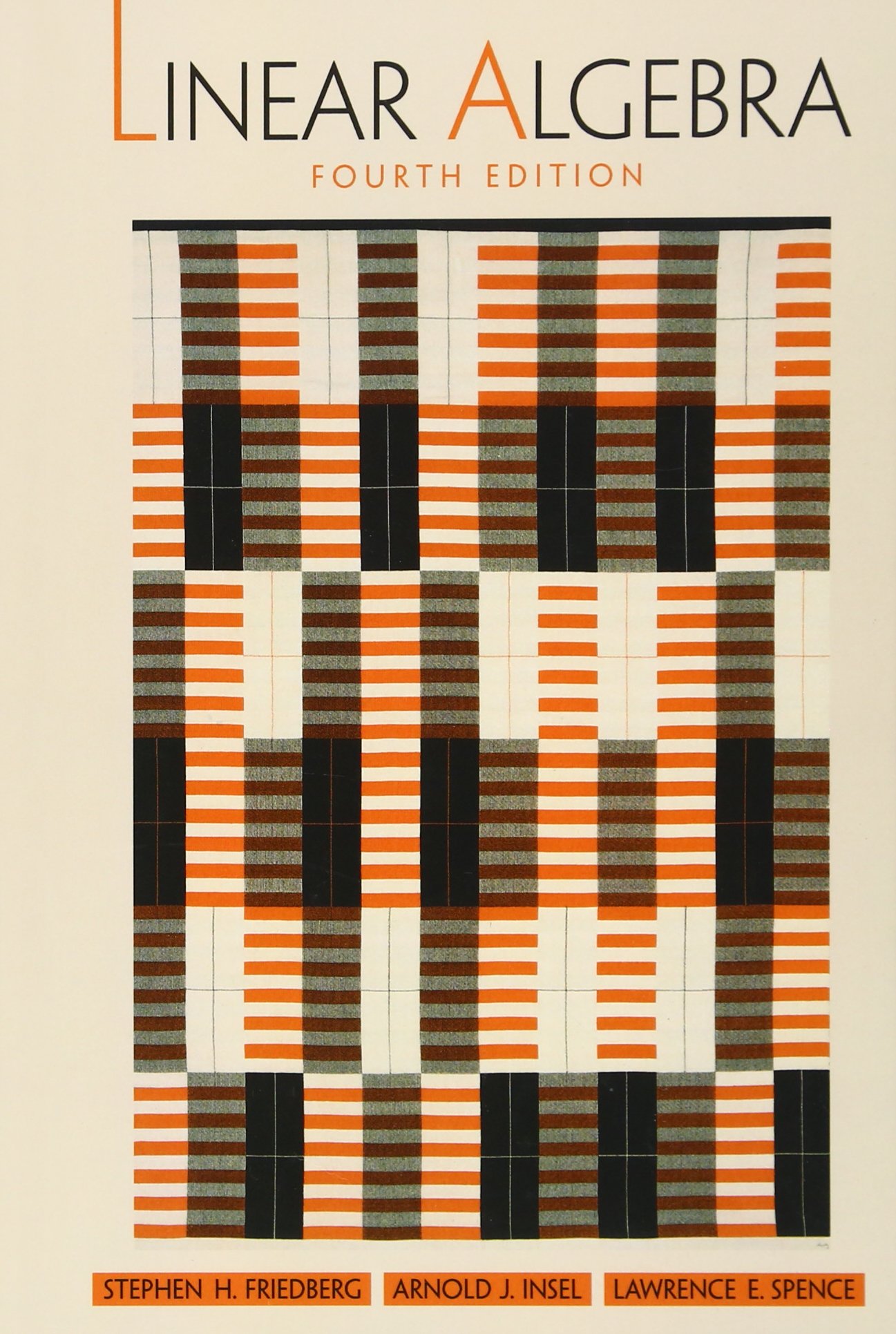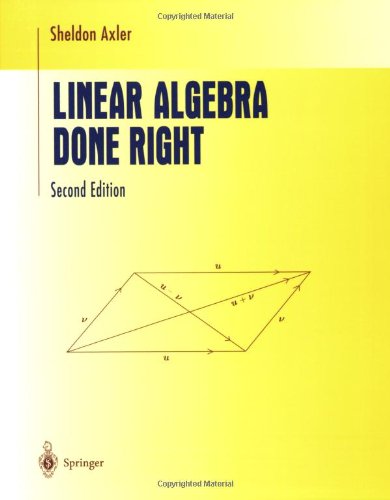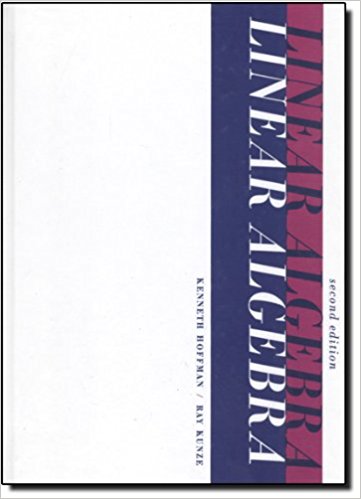Linear Algebra [MATH 350] (Section 01), Fall 2018
General Information
- Instructor: James Greene
- Email: j{dot}c{dot}greene{at}rutgers{dot}edu
- Office: 216 Hill Center
- Office hours: M: 12-1, W: 2-3, or by appointment
- Class location: SEC-203 (Busch campus)
- Class times: Monday and Thursday, 10:20-11:40 am
- Textbook:
 |
Main text
Linear Algebra (4th edition): Stephen H. Friedberg, Arnold J. Insel, and Lawrence E. Spencer
You are expected to read the assigned sections (see the Course Calendar for sections)
|
 |
Suggested text
Linear Algebra Done Right (2nd edition): Sheldon Axler
|
 |
Suggested text
Linear Algebra (2nd edition): Kenneth M. Hoffman and Ray Kunze
|
- Exam 1: Thursday, October 11th, in class
Exam 1 information and review problems
Note that the review problems are not all encompassing, and you are responsible for all material covered in class. These are just a sample of some types of problems to expect.
Also, this is much longer than the actual exam will be, so do not interpret it as a practice exam. If you find any
issues with any of the problems (such as you think they are incorrect as stated), please let me know. This document was written in haste.
- Exam 2: Thursday, November 15th, in class
Exam 2 information and review problems
The same as stated for Exam 1 above holds for this set of review problems.
- Exam 3 (Final): Tuesday, December 18th, 12-3 pm, SEC-203
Final Exam information and review problems
The same as stated for Exams 1 and 2 above holds for this set of review problems.
Catalog Description
This course is a proof-based continuation of Math 250, covering Abstract vector spaces and linear
transformations, inner product spaces, diagonalization, and canonical forms. Possible additional topics
include (but are not limited to): systems of ordinary differential equations and numerical techniques.
Prerequisites
MATH 250, MATH 300, AND (MATH 244, MATH 252, OR MATH 292, i.e. differential equations). In laymen’s terms,
you should have a good understanding of the standard engineering calculus sequence through ordinary
differential equations, as well as linear algebra and proof-writing. Of course, as this is a linear algebra course, a solid understanding of the material
presented in MATH 250 is essential. For a brief refresher of topics covered in Math 250, see here.
Many examples will be taken from systems analyzed in calculus courses; for example,
the space of continously differentiable functions on [0,1] is a vector space. You will also be required to write precise proofs,
both in collected homework and on exams/quizzes. Most major theorems will be proven in class, and I will assume that you are comfortable in both
following and constructing basic proofs on your own. If you have any concerns regarding the prerequisites, please do not hesitate to contact me.
Grades
Formally, grades will be determined by homework, quizzes, and three exams. The breakdown is as follows:
| Homework |
15% |
| Quizzes |
15% |
| Midterm I |
20% |
| Midterm II |
20% |
| Final Exam |
30% |
Standard grading cutoffs apply (A ≥ 90%, 80% ≤ B < 90%, etc.), but will possibly be adjusted
(in the student’s favor only) for “borderline cases” and in the case I deem a curve necessary. Note that
any curving will be calculated at the end of the semester, but distributions for exams and homework will be provided.
Homework Homework will be assigned weekly, and will typically be due one week after assignment. All assignments
will be distributed on the Course Calendar, and should be turned in by the end of class on the due date. The
two lowest grades will be dropped. Late homework will NOT be graded.
Quizzes Quizzes will be given periodicially throughout the semester in class. Problems will be comparable in difficulty to the assigned homework, and will
cover recent material. Each quiz should take no more than 20 minutes, and will be announced in advance. I will drop your one lowest score.
Note on collaboration You are encouraged to work together on homework assignments, but problem sets
should be both written up and turned in individually. Furthermore, only submit work that is your
own. Plagiarism is a serious offense, and will result in a score of zero for the assignment, as well as
possible punishment from the University. You must also cite any reference you use and clearly mark
any quotation or close paraphrase that you include. Such citation will not lower your grade, although
extensive quotation might.
Exams The Final Exam will take place during the Exam week; it appears we are scheduled for December 18th, from 12-3 pm, in our normal classroom (SEC-203).
Note that it will be cumulative, but possibly more heavily weighted to the material since Midterm II.
The other two exams will take place in class, and with dates as listed above.
In general they will be closed book, and no calculators or other electronic devices will be permitted. Material covered on each exam will be specified closer to the
corresponding dates.
Attendance and Participation
Students are expect to attend class regularly, as well as actively participate in discussions. Although not defined as a
fixed portion of your final grade, participation will influence your overall performance in the class, especially in "border cases."
If a class period is missed, you are expected to read and understand the material on your own; see the Course Calendar
for detailed information and readings covered that day. For information on absence reporting and missing exams, see Absences and Make-ups below.
I reserve the right to lower the course grade up to one full letter grade for poor attendance.
Tenative Schedule
This class will follow the main text of Friedberg, Insel, and Spence fairly carefully, although material
will at times be supplemented from other sources. I will keep an updated class schedule on the webpage
(Course Calendar) during the semester, which will include sections covered, quizzes, homework postings with
due dates, and recommended problems, as well as other information that may be pertinent for the class. Please check back frequently!
I plan to cover most of the main text, but if there is material you are especially interested learning about, please feel free to let me know.
Below you will find a tentative schedule for the course, along with the approximate number of weeks spent on the particular subject:
| Abstract Vector Spaces |
3 weeks |
| Linear Maps between Vector Spaces |
2 weeks |
| Systems of Equations |
1 week |
| Determinants |
1 week |
| Diagonalization and Applications |
2 weeks |
| Inner Product Spaces |
2 weeks |
| Canonical Forms (Jordan, Rational, Spectral) |
2 weeks |
Students are expected to attend all classes; if you expect to miss one or two classes, please use the
University absence reporting website to indicate the date and reason for your absence. An email is automatically sent to me.
For longer absences, students should email me details regarding the situation. Please note that there will be no make-ups for quizzes or exams.
If you have a major medical or personal problem and plan to miss an exam, please contact the instructor by email, with a note from the Dean's office to
authenticate an absence that is supported by appropriate documentation.
Academic Integrity Policy
All students in the course are expected to be familiar with and abide by the academic integrity policy.
Violations of this policy are taken very seriously.
Students with Disabilities
Full disability policies and procedures are indicated here.
Students with disabilites requesting accommodations must present a Letter of Accommodations to
the instructor as early in the term as possible.
Sakai
I will use Sakai for email contact, as well as to post homework and quiz solutions. All enrolled students
should have automatic access to the site after logging in to Sakai. Make sure to frequently check your email associated to your
Sakai account.


